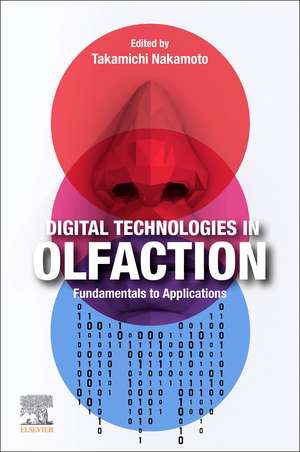Digital Technologies in Olfaction: Fundamentals to Applications
Editat de Takamichi Nakamotoen Limba Engleză Paperback – 27 ian 2025
The book is systematically divided into three main sections: Odor sensing systems: Provides an overview for a variety of devices for odor sensing systems and addresses the concept of active sensing (sensing methodology) and its application to machine olfaction; Cheminformatics: Introduces chemometrics and the concept of odor space. This section also addresses odor reproduction and odor impression predictions; Olfactory displays: Addresses the applications of odor presentation and olfactory display. This section enables its readers to learn a modernized way of scent presentation.
Digital Technologies in Olfaction: Fundamentals to Applications is a valuable resource for chemists and biologists who are interested in olfaction and artificial intelligence.
- Systematically presents up-to-date developments in olfaction for a chemistry audience
- Addresses modernized chemometrics for olfaction
- Presents the digitization of olfaction and how it can be applied to sensing, cheminformatics, and odor presentation
Preț: 898.30 lei
Preț vechi: 1178.77 lei
-24% Nou
Puncte Express: 1347
Preț estimativ în valută:
171.91€ • 178.39$ • 143.69£
171.91€ • 178.39$ • 143.69£
Carte tipărită la comandă
Livrare economică 08-22 martie
Preluare comenzi: 021 569.72.76
Specificații
ISBN-13: 9780443157219
ISBN-10: 0443157219
Pagini: 300
Dimensiuni: 152 x 229 mm
Greutate: 0.45 kg
Editura: ELSEVIER SCIENCE
ISBN-10: 0443157219
Pagini: 300
Dimensiuni: 152 x 229 mm
Greutate: 0.45 kg
Editura: ELSEVIER SCIENCE
Cuprins
Part I Background
1. Introduction to digital technologies in olfaction
2. Physiology of olfactory sense
Part II Odor sensing system
3. Overview of olfactory sensors
4. Quartz Crystal Microbalance sensors
5. Odor biosensors
6. Active odor sensing system
Part III Cheminformatics in machine olfaction
7. Fundamentals of chemometrics techniques
8. Concept of odor space
9. Odor impression prediction using multi-dimensional data analysis
10. Odor impression prediction using natural language processing
11. Odor reproduction using odor components
12. Odor reproduction based on several divergences
13. Analysis for interference removal in odor reproduction
Part IV Olfactory displays
14. Fundamental techniques of olfactory displays
15. Multicomponent olfactory displays
16. Wearable olfactory displays
17. Digital contents with scents
18. VR environment with computational fluid dynamics
19. Olfactory displays for teleolfaction
20. Olfactory art
Part IV Conclusions
21. Conclusions
22. Future of machine olfaction
1. Introduction to digital technologies in olfaction
2. Physiology of olfactory sense
Part II Odor sensing system
3. Overview of olfactory sensors
4. Quartz Crystal Microbalance sensors
5. Odor biosensors
6. Active odor sensing system
Part III Cheminformatics in machine olfaction
7. Fundamentals of chemometrics techniques
8. Concept of odor space
9. Odor impression prediction using multi-dimensional data analysis
10. Odor impression prediction using natural language processing
11. Odor reproduction using odor components
12. Odor reproduction based on several divergences
13. Analysis for interference removal in odor reproduction
Part IV Olfactory displays
14. Fundamental techniques of olfactory displays
15. Multicomponent olfactory displays
16. Wearable olfactory displays
17. Digital contents with scents
18. VR environment with computational fluid dynamics
19. Olfactory displays for teleolfaction
20. Olfactory art
Part IV Conclusions
21. Conclusions
22. Future of machine olfaction
